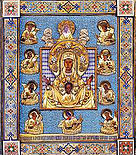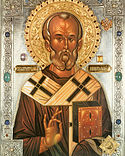If the Metropolitan Agafangel does not preach heresy, you do not have the right to separate yourself from him.
The 14th canon of the First-Second Council of Constantinople states: “If any Bishop, on the basis of charges against his own Metropolitan, shall secede or apostatize from him before a conciliar verdict has been issued, and shall abstain from communion with him, and fail to mention his name, in accordance with established custom, in the course of the liturgical celebration of the Eucharistic mystery, the Holy Council has decreed that he shall be deposed from office…”
This rule thus prohibits bishops from ceasing to commemorate a Metropolitan accused of any sin before he is adjudged by a Council.
The subsequent 15th rule, however, provides us with the single exception: “when he publicly preaches heresy.” In this case, subordinate clerics are required to break communion with the heretic.
For some reason this rule is usually misinterpreted in the sense that if a bishop is not a heretic, all of his actions must be tolerated. It is as if adherence to orthodoxy provides immunity to commit all manner of lawlessness.
What is overlooked is that this rule requires that he be commemorated not indefinitely but only until a “conciliar examination”, i.e. until a trial. According to church canons, the accused, irrespective of the high rank he may hold, must submit to the court. The canons also require that this court not be delayed for a lengthy period of time.
Accusations against Met. Agafangel have been made many times, but with the support of the majority of bishops, he has eluded trial. This is the reason why the All-Diaspora Council is a necessity. Until the All-Diaspora Council is convened Abp. Andronik continues to commemorate the name of the Metropolitan during the liturgy.
It should be noted that in ancient times there have been instances in which a priest broke communion with his bishop for reasons other than dogmatic heresy. For example, St. Theodore the Studite broke communion with Patriarchs Nikeforos and Tarasios not because of a dogmatic heresy, but because of the fact that they were in communion with the priest Joseph, who performed the adulterous marriage of the Emperor Constantine.
Those who assert that the presence of heresy is the only reason for separating from a bishop, have apparently forgotten about phenomenon such as Sergianism. Sergianism is not a dogmatic heresy, but it is worse than any heresy because while seeming to adhere to dogmas and canons, it destroys the very essence of Christianity.
In earlier times, the devil fought the Church through dogmatic heresies. Today his tactics are different. Modern people are not interested in dogmas and thus dogmatic heresies do not attract anyone. The great temptation of our time is a False-Church that appears completely canonical and orthodox, but is in fact alien to the spirit of Christ. Where lies, hypocrisy, lack of mercy, and self-interest reign, there cannot be Christ.

